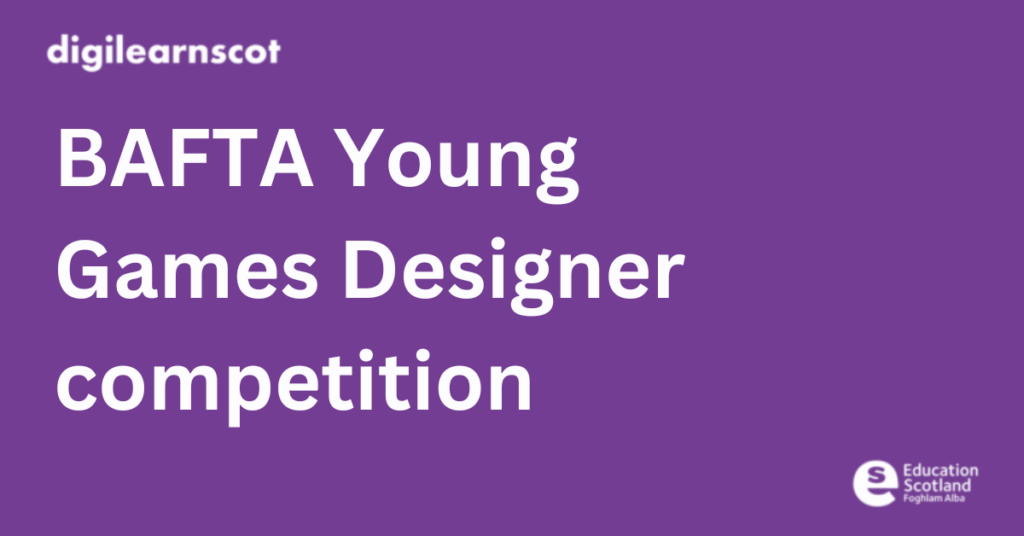
Scottish Digital Literacy Week is back for 2025!
Click the link below to find details of upcoming events and sign-up details
Catch up with recaps of the events hosted throughout the week below:

Any posts with this will be shown on the home page (latest) and new page

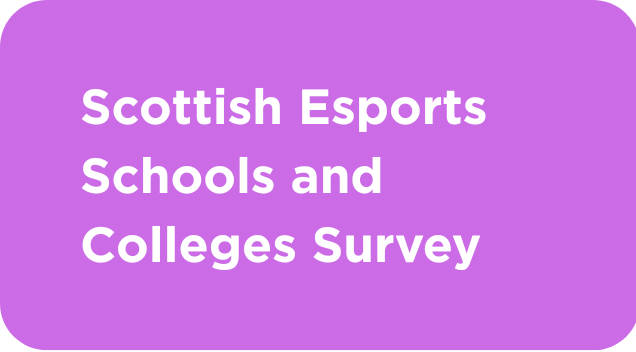
This initiative aims to provide a structured competitive framework that supports Curriculum for Excellence, develops learners’ meta-skills, enhances digital skills, and aligns with national qualifications including the NPA Esports and HNC Esports.
Provide your feedback using this link: Scottish Esports Schools and Colleges Competition survey
For more information or queries, contact: info@scotesports.org

Information literacy is a key skill for people who are trying to navigate an increasingly complex information landscape. To help empower people to understand the tools and tactics that they can use to make sense of information online, Google is partnering with CILIP to launch the Super Searcher training programme in the UK. Google have successfully rolled out this initiative in America with the American Library Association and in Europe with Public Libraries 2030.
Under this partnership, librarians and other library staff across the UK will be trained on best practices from information literacy experts to help evaluate information online. In turn, trained library staff will be able to educate, support and empower library service users to strengthen their information and media literacy skills and their ability to critically evaluate online news and media at a time when finding quality information online is more complex than ever.
The pilot for the training programme will focusing on public and school library workers across all four nations in the UK and will run from June to December 2025.
For more information on how you can get involved, please email:
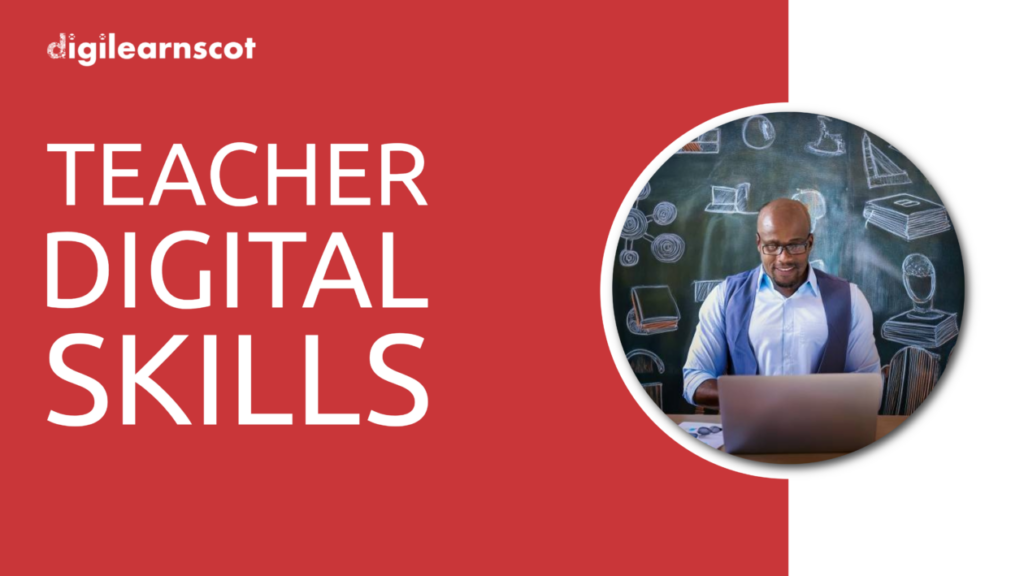
Our Teacher Digital Skills Toolkit has been available for over a year now. It contains guidance on what skills and knowledge teachers in Scotland should have to meet the General Teaching Council for Scotland (GTCS) standard for registration, which requires teachers to be ‘digitally literate’. There is also short videos to support some of these skills and knowledge, as well as links to the Barclays Digital Wings free learning pathway, which covers all of these.
Beside the guidance, there is a Form for teachers to evaluate their essential skills, knowledge and confidence. We’ve now had almost 200 responses from 25 local authorities and the results are positive:
Have you evaluated your digital skills recently? Take the survey and let us know how you get on!
essential skills checklist evaluation


Ted Palenski from the University of Glasgow delivered this live lesson aimed at children and young people of all ages.
Artificial intelligence has long been a component of search engines: how results are surfaced, ranked, and presented. This session breaks down how search engines work, and how they increasingly leverage generative AI, possibly to the detriment of close reading.
The aim of the session is to foster critical information literacy, offering several examples of how search engines might not give you the most relevant information, with some suggested strategies for navigating digital spaces overloaded with information.


David Lundie from the University of Glasgow delivered this webinar during Scottish Digital Literacy Week 2025.
The Teaching for Digital Citizenship project has been working with teachers, young people, ethicists and the EdTech sector across the 4 nations of the UK, to understand the aims, practices and challenges in recovering a space for moral agency in a post-digital world.
Citizenship, ethics and justice will be central to our new digital literacy curriculum updates.
The aim of this session is to set out a data justice approach, in which all young people have a right to information integrity – to understand that our current information ecosystem is not inevitable, it is a product of technical and social conditions which can be acted upon and changed.
We are looking to engage teachers in processes of reflection on their own practice, drawing on examples of leading practice across the curriculum from our project so far, and introducing a self-evaluation tool which has been co-designed with teachers in our community of practice.
Find out more about the project with this link: Teaching for Digital Citizenship: Digital ethics in the classroom and beyond


This video was recorded during Scottish Digital Literacy Week 2025. It features Sharon Alexander, who is Principal Teacher at Carnwath Primary School – that was the first school in Scotland to achieve all four digital awards:
Discover the innovative strategies and practical approaches that have made Carnwath Primary a leader in digital learning and teaching. Sharon will share real insights, challenges, and success stories to help you elevate digital education in your own school.
Find out more about Digital Schools Award Scotland with this link: Digital Schools Awards
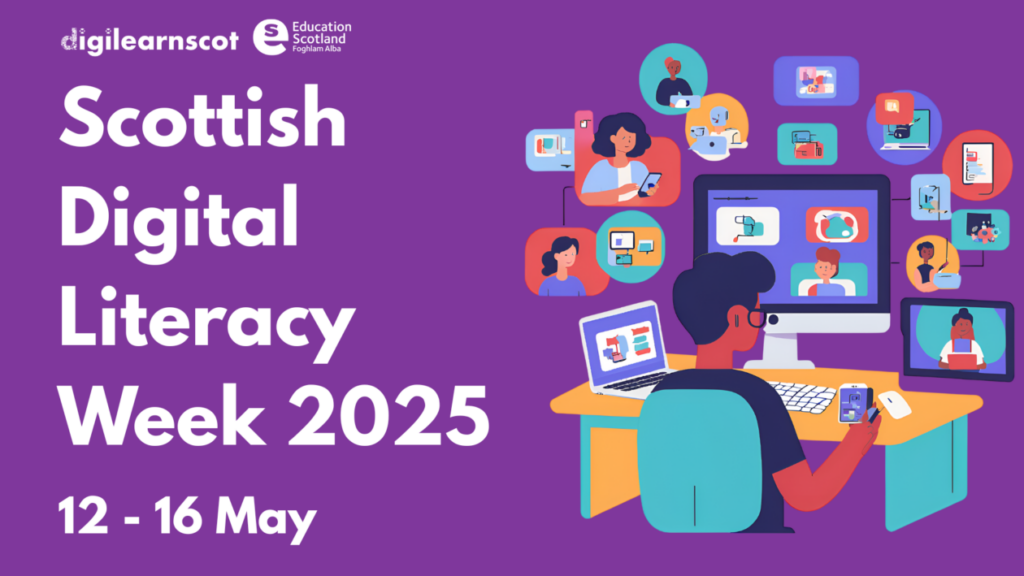
Any time Four Capacities challenge
The four capacities are central to our curriculum, and therefore learning, in Scotland.
We want to know what the four capacities look like in your setting – what does it look, sound or feel like to be:
Use your digital skills to create an image, photos, video or audio recording that tells us how you learn about these things. Educators can share their learners’ content with us by posting a comment on this blog post.
Here are some examples of Scottish learners sharing their learning with the BBC LAB:
The L.A.B Scotland projects
The BBC LAB also has these short tutorials on how to create your own media:
The L.A.B Scotland How Tos
If you’re using iPads to create your content, try these guides to inspire you:
Apple Everyone Can Create: Projects
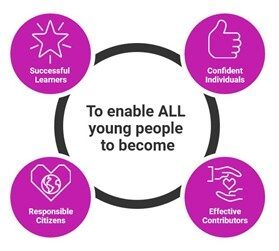
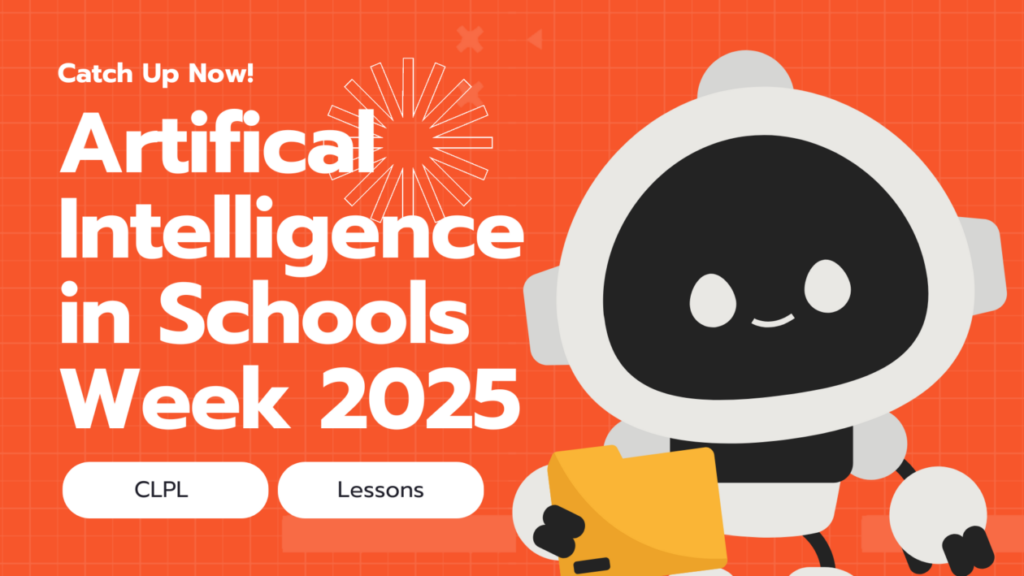
Welcome to out Catch Up Gallery of recordings from AI in Schools Week 2025. You will find recordings of CLPL sessions and live lessons on this page.
Full resources to support the delivery of the live lessons in class can be found at
Playlist

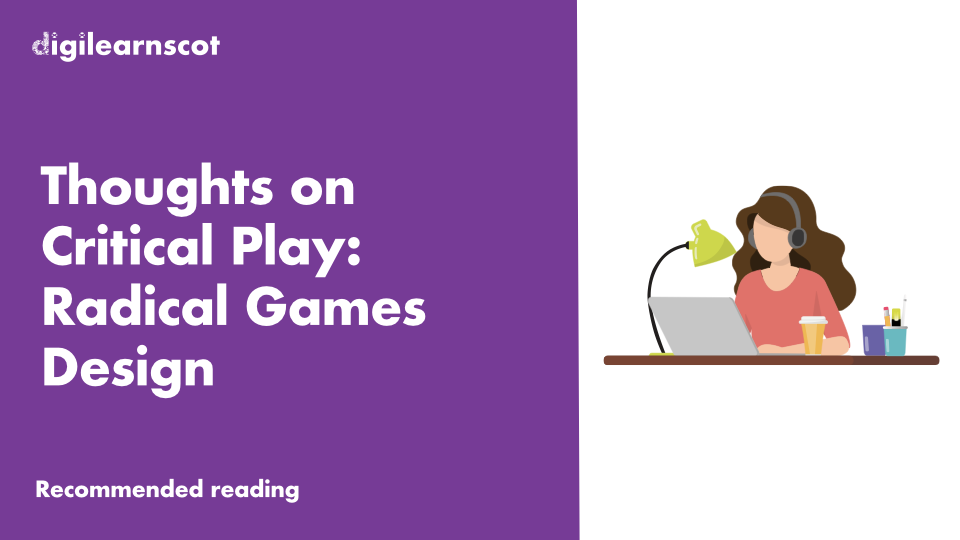
This blog is a summary of Mary Flanagan’s book Critical Play; Radical Game Design. This was recommended by Dr Tom Brock, who is a Senior Lecturer in Sociology at Manchester Met, after he spoke at the recent Scottish Esports Conference 2024. With the book on order, it was only possible to access the first chapter on Google Scholar. This post is a summary of those initial points but are subject to change with further reading.
Flanagan starts off by identifying games as “a significant cultural medium across a wider range of social, economic, game and gender categories” that are still new and not as valuable as other forms of play. These points might be useful to consider games as art, as media and as play.
Defining games
For a definition of games, Flanagan refers to Salen and Zimmerman’s (2003) definition of games as an artificial system with player, rules and a quantifiable outcome or goal. The artificiality of games aligns with Tina Bruce’s ‘12 features of play’ (2020) as ‘possible, alternative, imagined worlds which involve ‘supposing’ and ‘as if’ situations.’
In addition to these features, Flanagan refers to Greg Costikyan (1994) who says that while ‘stories are inherently linear’ and games are ‘inherently non-linear’ the more a game is story-driven then the more linear and less of a game it becomes. This distinction on linearity would separate games from other media, such as books, film and music in most cases.
Are games play?
However, the requirement for outcomes puts games at adds with the Scottish Government’s National Play Strategy and another of Bruce’s ‘features of play’.
The Scottish Government defines play as ‘freely chosen, personally directed and intrinsically motivated. It is performed for no external goal or reward’ (2013). Bruce also makes this distinction between play and games as play does not have ‘externally imposed rules, goals, tasks or a definite direction’ (2020).
Agreeing that games and play are distinct, there are still valuable similarities worth exploring. Both play and games include their being ‘freely chosen, personally directed’ (Scottish Government, 2013) and being ‘not-work’ and ‘diversionary activities’ (Flanagan, 2009). Flanagan states that games can ‘create cognitive and epistemological environments that position the player or participant with the experiences [of play] in meaningful ways’ (2009). Similarly, Bruce identifies that play “helps children to function in advance of what they can actually do in their real lives. They can drive a car, perform a heart operation, be a shop keeper.” (2020)
Are games art?
Might games be considered art? Flanagan considers games may be ‘outlets for creative expression, conceptual thinkings or to examine or work through social issues?’ There are similarities between this and another of Bruce’s features of play: “Play is about wallowing in ideas, feelings and relationships and the prowess of the physical body. It helps the process of becoming aware of self in relation to others and the universe. It brings unity and interconnectedness” (2020).
As well as ‘playing’ games, Flanagan also explores the concept of ‘making for making’s sake’ to distinguish being creative with games from the commercial development that is traditional games design. She considers that games can be ‘a medium of expression but using elements common to games as the materials.’ In his book, The Element, Ken Robinson states that creativity can be thought of as “a conversation between what we’re trying to figure out and the media we are using” (2009). For Robinson it is impossible to separate the idea from the medium because creativity is “about making things […] it always involves using media of some sort to develop ideas” (2009).
Conclusion
In conclusion, games should be considered distinct from play. This does not devalue their cultural significance – there are many similarities between games and play and we should explore these. Indeed, we may want to explore games as a medium through which to explore ideas, of ourselves, others and the world around us. Realising the Ambition (Education Scotland, 2020) states that:
The experiences and spaces for play we facilitate for the children should reflect the children’s ideas, aspirations, curiosities and next steps in their learning. It is through play that children learn about themselves and make sense of the world around them.
In this sense we should certainly encourage games as part of their learning.
You must be logged in to post a comment.